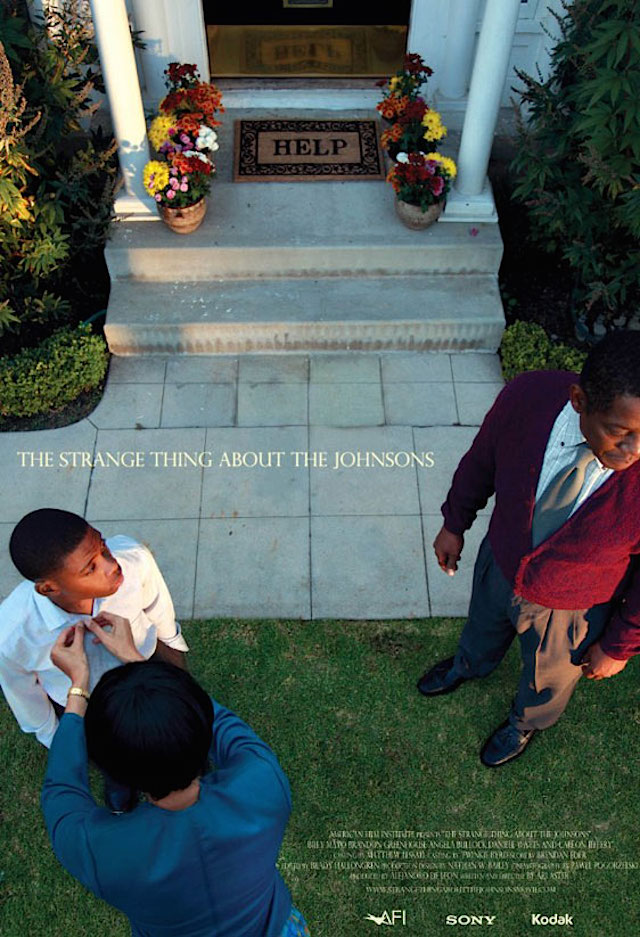It’s hard enough finding time to review all the full-length movies I want to discuss on this site, so I generally don’t delve into short films very much unless there’s historical significance, but The Strange Thing About the Johnsons is so striking, it’s literally impossible to ignore. Its images sear themselves into the back of your eyeballs, and its disturbing content nags at your consciousness, challenging you to consider its implications and importance on both a creative and a social level.
Since the surprise factor is part of the unnerving viewing experience, I’ll refrain from divulging the plot, but let’s just say the opening scene, in which the father walks in on his masturbating son, is the LEAST cringe-worthy moment in the movie. In the most general terms, it’s about a well-to-do African-American family whose seemingly perfect facade hides dark secrets beneath the surface. And the more those secrets reveal themselves to us, the more our jaws hit the floor.
The Strange Thing About the Johnsons defies comparisons and labels. I wouldn’t call it horror, but it veers close enough that it’s worthy of comment. It’s more like a mix of drama, a warped Fatal Attraction-type thriller and dark, DARK satire. While its content is disturbing in and of itself, the fact that the central family is black has made it an even more polarizing affair, with some claiming it paints African Americans in a culturally false, morally corrupt light. But I would argue that this portrayal is one of the film’s strengths, not a weakness.
This is a type of movie — and the sort of subject matter — that we rarely see revolve around black characters, so in an inclusionary sense, it’s a welcome addition to the racial canon. Having fought for well-rounded, robust cinematic representation for over 100 years, black folks should embrace a broad range of roles. Yes, we should try to minimize the racially demeaning stereotypes that became all too familiar through the birth of Hollywood and beyond, but that doesn’t mean we can’t play imperfect characters — villains even.
Of course, you want to make sure that the roles we get aren’t predominantly villains, criminals and degenerates, but those types of characters shouldn’t be completely off the table. Ideally, we should have a well-balanced, complex spectrum of characters ranging from good to bad, with all the gray areas in between — you know, like real people.
Overcompensating for the long history of crass stereotypes leads to black characters who are so perfect, they’re boring, sterile, unreal caricatures. This is what led to the wave of “positive” movie and TV stereotypes in the ’80s, like judges, mayors and police chiefs — positions of authority who can claim moral decency and social standing but remain one-dimensional and completely inconsequential to the plot.
Thus, the fractured family in The Strange Thing About the Johnsons is a breath of fresh air. They aren’t an indictment of black home life as a whole any more than the Sawyer family in The Texas Chainsaw Massacre is an indictment of white home life. They’re a jacked-up family that just happens to be black. It’s the epitome of colorblind casting. And that’s a good thing.
Of course, you’re still welcome to be repulsed by the storyline, but don’t say that the cast shouldn’t be black unless you’re prepared to say they shouldn’t be white either. Or Latino or Asian or Middle Eastern or whatever. Basically, feel free to wish this movie doesn’t exist, but personally, I’m glad it does. As a jaded filmgoer, it’s rare to come across something that catches me off guard, that makes me gasp, that challenges my sensibilities, and The Strange Thing About the Johnsons is just such a work. (Writer-director Ari Aster would go on to bring us feature films Hereditary and Midsommar, so “shock” is sort of his thing.)
That said, it’s not shocking merely for shock’s sake. There’s a method to its madness. It’s pitch-black satire, not only undermining the traditional nuclear family, but also skewering self-help gurus (of which the father is one) and — a bit like Get Out — liberalism pushed to the extreme. The family’s overly permissive, touchy-feely but ultimately emotionally hollow approach to their issues is an exaggeration of the sensitive “snowflake” mentality (predating the recent over-politicization of the term) that causes the situation to snowball into an avalanche out of which even the self-help guru can’t dig himself </snow references>.
It’s ridiculous and over the top, but such is the nature of satire. If it were a full-length film, it might wear thin, but for a 20-something-minute short, it’s a jolt of inspired mania.

